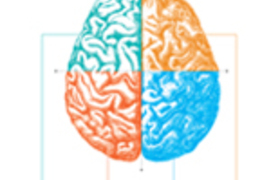Is happiness good for you?
10 January 2014
Should psychiatry as a profession be working towards creating happiness? This is just one question among many posed by psychiatrist and UCT lecturer Dr Kerry Louw.
Do we feel pressure to be happy?
Turn to the index of most psychiatric textbooks, and you won't find much mention of happiness. "We don't have a neat definition for happiness within psychiatry," observes Louw. "With a growing focus on the recovery model, there is potentially a place for dialogue with patients about happiness and well-being, but in current clinical settings we rarely speak with patients about what happiness means to them." In the case of psychiatric literature, one of the most famous citations of happiness is the tongue-in-cheek 1992 paper by RT Bentall titled "A proposal to classify happiness as a psychiatric disorder", in which he claims happiness is irrational and should be renamed 'major affective disorder, pleasant type'.
While the paper is more a criticism of the methods of psychiatric diagnosis than a realistic proposal, according to Louw it does highlight the potential harm (associated with being happy) of feeling you have greater control over your environment than you really do. In her words:"Looking at the situations of many of our patients today who come from toxic home situations or multi-generational dysfunctional families, they have almost no control over their environments. For them, feeling more in control than they actually are may be harmful."
Within local popular culture and across global social media there is also enormous pressure on people to 'be happy', according to Louw. "Is this idea of happiness really a fair portrayal of well-being, or does it gloss over the necessary suffering that accompanies any life?" she asks. "Especially given the context of many of our patients, is this idea of happiness realistic, or does it set up impossible expectations for people?"
Should psychiatrists be working towards creating happiness?
Louw describes several ways that psychiatry attempts to increase happiness in individuals: "There is of course positive psychology, which advocates supporting positive emotions rather than treating negative symptoms. While there have been positive results achieved, to my mind it does sound a little too good to be true, on the grounds that it fails to take into account the complexity of human relationships and experience."
She also points out the huge increase in the prescription of anti-depressants since the advent of widely available SSRIs (selective serotonin re-uptake inhibitors).
"I think this is indicative of the fact that we are living in a time of two opposing views, between neuroscience (and the idea that every symptom should be targeted pharmacologically) and the more ancient principles of mindfulness (and the benefits of non-invasive and non-chemical forms of therapy, such as exercise). While I think that we need to identify depression, we should be careful not to over-medicate or pathologise people who are merely dealing with very difficult emotions."
Happiness is good for you
There are physical consequences to being depressed or experiencing negative emotions such as chronic stress ? Louw cites examples such as increased risk of diabetes, stroke, cardiovascular disease, and less positive outcomes in diseases such as HIV ? but is the opposite also true: does happiness make you more physiologically well?
According to Louw, yes ? to a degree. "Emotional vitality has been found to be associated with more positive outcomes in cardiovascular disease patients, and overall increased longevity," she says. "In a large, prospective (with a mean follow-up of 15 years), population-based study of over 6 000 participants by Kubzansky, it was found that emotional vitality was protective against new-onset coronary heart disease; and furthermore, that there was something intrinsic about being happy ? as opposed to the lack of being depressed – that had positive and restorative effects on people's physiological health."
In conclusion, Louw advocates finding a balance between allowing for depressive realism ? the fact that feeling less than happy might be a rational way to respond to personal circumstances or environment ? while also looking at ways to increase emotional vitality so as to encourage both emotional and physiological well-being.
Five ways happiness is good for your health
- Happiness boosts the production of immune-boosting hormones such as serotonin, dopamine, relaxin and oxytocin
- People who report being happy recover better from illness and surgery
- Happy people have been shown to have lower blood pressure
- Cancer patients who report a positive state of mind have better survival rates
- The incidence of cardiovascular disease has been found to be lower in people who describe themselves as having a high level of emotional vitality
"This lecture was given as part of a symposium sponsored by UCT's Brain and Behaviour Initiative. Read more about what classics scholar Professor Clive Chandler and philosophers Dr Tom Angier and Professor Thaddeus Metz had to say about happiness and well-being."
Story by Ambre Nicolson. Photo by Michael Hammond.
This lecture was given as part of a symposium sponsored by UCT's Brain and Behaviour Initiative. Read more about what classics scholar Professor Clive Chandler and philosophers Dr Tom Angier and Professor Thaddeus Metz had to say about happiness and well-being.
Read more:
Happiness and virtue theoryLiving well by ubuntu
A four-part drug to secure happiness
 This work is licensed under a Creative Commons Attribution-NoDerivatives 4.0 International License.
This work is licensed under a Creative Commons Attribution-NoDerivatives 4.0 International License.
Please view the republishing articles page for more information.
Books
Opinions
Focus
Previous Editions










